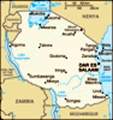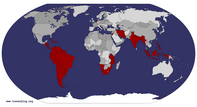Advertisement
After a week at our very private Mango Drift resort on the lovely island of Likoma in Lake Malawi, where we were the only guests for the whole week, we left with the MV Ilala which departed a few hours late so we got to spend another night sleeping on the upper deck of the ship. It was cold so we did not sleep a lot and we arrived in the middle of the night in Nkhata Bay where we got ourselves a very nice bungalow right on the lakeshore at Mayoka Village the next morning. The lake is providing such attractive surroundings that we got to spend another few days snorkelling and canoeing before we continued and traveled up north to Mzuzu. In Mzuzu the next morning we got a ride with Johan, a South African living in Malawi now for a few years. He was on a business trip and he was just going to drop us off somewhere close to the Vwaza Marsh park entrance but after chatting for a few hours with us he spontaneously decided to come with us in to the park instead. After buying the essentials like a (alive!) chicken and a box of
beer we had a great afternoon and evening together in the park. The huts we stayed in in the park were right on the shore of a shallow lake filled with lots of hippos whose snorting and grunting sounds kept us awake during the night. We did a game drive with Johan, who basically was brought up doing game drives in SA and we talked till late around a campfire under the star filled sky without moon.
The next day, after another short game drive, Johan dropped us at a crossroad where we got picked up by a bus within one minute and drove to Chitimba and then with a nearly disintegrating 4WD up the very steep and accident prone ‘road’ to Livingstonia, a small village on the rim of the mountain range overlooking Lake Malawi. We stayed at the Mushroom Farm, an institute name amongst backpackers in Southern Africa. What’s nice about the Mushroom Farm, besides the beautiful views, nice accommodation and good food is that they are a very successful community based enterprise run mostly by locals and using profits for projects that benefit the same locals. They are also quite successfully running a permaculture garden and
now even expanding this with the growth of coffee.
After a hike to and through the old mission village of Livingstonia we got ourselves safely down to Chitimba the next day and spent another day at the lakeside before travelling up to the border leaving Malawi and entering Tanzania. Directly after entering Tanzania we notice both a lot of similarities with Malawi and a big difference.
Although Tanzania, and especially the region where we enter the country, is also still one of the poorest countries of the world, there are noticeably more developed towns, better constructed houses, a better public transport system with big busses that leave according to schedule, a steady and reliable electricity supply, a lot more variety in local places to stay and eat and a lot more people that are better off and have money to spend on clothing, shoes, food, healthcare and housing.
What’s not different is the friendliness of the people. We are glad to find the people in this part of Tanzania as friendly and welcoming as in Malawi and we are still cheered at with ‘mzungu, mzungu!’ by the kids on the streets, almost everybody we meet walking on
the rural streets and roads greets us and a lot want to have a small chat. This might sound like something we have been saying since the start of our travelling in Central and South America but it’s something we are going to miss a lot when we leave this continent. We realise that almost all the local people we meet are much more friendly, welcoming, social, interested in us than we are used to in especially our western society. In our part of the world we are all so occupied, busy and stressed out that we don’t feel like asking others how they are doing and what they are up to today. We seem to loose interest in strangers because we are so extremely busy with ourselves. We apparently feel like we don’t have the time to just have a friendly chat. This is an insight about ourselves that we see coming back in almost all less developed countries we have visited and we struggle to explain to people what it’s like in our country and where this comes from.
Where in Malawi the ferry on the lake was a real ‘oldy’ and there were no jetties so
that we have to wade through the water to the shore, now we travel on a more modern ferry with trucks driving on and off via a pier. We still find ourselves staying at local hotels and lodges and as in Malawi there are mostly locals staying in these places but in Tanzania the quality of the rooms is better even in the cheap hotels and we meet more Tanzanians that are traveling for leisure and social reasons not only for business. Tourism in Tanzania is much more developed and the government clearly tries to make as much money from tourists as they can by raising the entry fees to the parks and concessions fees for the lodges in the national parks.
We spent one night in Mbeya and continued to Sumbawanga the next day from where we reached the small village of Sitalike on the border of Katavi National Park. Our room in the Riverside Lodge is right next to a river (duh) in which some huge hippos are residing. In the evening when it got dark we were suddenly scared out of our chairs by a huge hippo crossing between the houses of the lodge. The hippo
was as shocked as we were and sped off the other way while we jumped inside our room.
We visited the Katavi park with a private guided game drive from sunrise to sunset, looking very hard for big cats, but unfortunately they were not anywhere near us. We do see a lot of big hippos, elephants and crocodiles in and around the river though and the park is beautiful, with wide wet plains and there are almost no other vehicles or tourists making this a great wilderness experience.
We continue to the pleasant town of Kigoma on the shore of another big lake, Tanganyika, where we spend the night and organised a visit to Gombe National Park the next day. A boat brings us to Gombe very early in the morning and we walk with a guide through the lush forest looking for chimpanzees. This time we are very lucky and the guide spots a few chimps in the trees. After a while they climb down and two mothers and their kids settle themselves at the base of the trees close to us. They are just chilling, feeding and grooming and they don’t seem to be bothered by
us or even notice us staring at them and taking pictures. It’s a beautiful experience because the chimps feel so human, so close to us and their faces and eyes are so full of expression. After a long while we continue our hike and stumble upon another small group of chimps which we can also closely observe.
In quite a good bus we take the long 17 hours ride to Mwanza, one of the bigger cities of this region, which is on the shore of the huge Victoria Lake. Every few hours the bus stops in a village and all passengers can procure what local specialty is for sale. We don’t dare to try the dark dried fish or greasy but skinny peaces of chicken but enjoy ‘chipsi mayai’ which is a local omelet with fries and some veggies in it.
The Victroria lake is huge, easily 1,5 times the size of the Netherlands and looks and feels like an ocean. Again we find this shoreside city a pleasant place and we walk around, have some good local food, try to sort out some options for visiting Serengeti and visit the interesting museum about one of the biggest
tribes of Tanzania the Sukuma (literally ‘the Northern people’) where we learn from the enthusiastic local guide about their traditional ‘witch’ doctors, their ritual dancing with big pythons and hyenas and play a game of bao. The word 'bao' is the Swahili word for wood, referring to the wooden board on which which the game is played and we see it played everywhere in Mozambique, Malawi and now Tanzania. It’s a very strategic game and we found it rather difficult to understand the play while there are only few rules but after playing with the guide we kind of nailed it so now we can join the locals on the streets in a game.
We catch a ferry and sail for 4 hours to Ukerewe Island, a very remote and off-the-beaten-track place. The Ukerewe people are still mostly fishermen and farmers and the island itself is apparently very fertile with almost every spot covered with rice fields, cassava plants, banana trees and other agro stuff. We eat the best tilapia fish in the restaurant of the local hotel we stay at, right on the small beach overlooking Lake Victoria, which is further only used by local businessmen and women
for meetings and by newly wedded couples for their photoshoots during the big day. We walk through the fields and through the villages of the island and every few minutes we are greeted by friendly locals, both adults and kids, curiously wanting to chat, cheer at us or practice their English (and we our KiSwahili).
Advertisement
Tot: 0.051s; Tpl: 0.013s; cc: 9; qc: 25; dbt: 0.0301s; 1; m:domysql w:travelblog (10.17.0.13); sld: 1;
; mem: 1.1mb





















D MJ Binkley
Dave and Merry Jo Binkley
Great photo
This makes us excited about our fall trip to Africa.